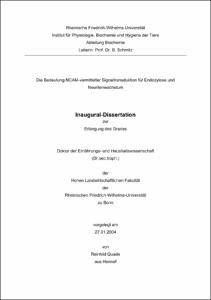Die Bedeutung NCAM-vermittelter Signaltransduktion für Endozytose und Neuritenwachstum

Die Bedeutung NCAM-vermittelter Signaltransduktion für Endozytose und Neuritenwachstum

| dc.contributor.advisor | Schmitz, Brigitte | |
| dc.contributor.author | Quade, Reinhild | |
| dc.date.accessioned | 2020-04-06T14:51:50Z | |
| dc.date.available | 2020-04-06T14:51:50Z | |
| dc.date.issued | 2004 | |
| dc.identifier.uri | https://hdl.handle.net/20.500.11811/2006 | |
| dc.description.abstract | Das neurale Zelladhäsionsmolekül NCAM ist ein membran-assoziiertes Glykoprotein, das auf der Oberfläche von Nervenzellen exprimiert wird. NCAM spielt eine bedeutende Rolle in der Entwicklung und Regeneration des Nervensystems und ist beteiligt an der Synapsenbildung sowie Lernprozessen und der Ausbildung des Langzeitgedächtnisses beim Erwachsenen. NCAM ist ein Mitglied der Immunoglobulin-Superfamilie und existiert in drei Hauptisoformen. NCAM180 und NCAM140 sind Transmembranproteine mit unterschiedlich langen zytoplasmatischen Anteilen. NCAM120 ist durch Glycosyl-Phosphatidyl-Inositol in der Plasmamembran verankert. Alle drei Isoformen beinhalten in ihrem extrazellulären Anteil fünf Ig-ähnliche und zwei Fibronektion Typ-III homologe Domänen (Cunningham et al., 1987). Da die PEST Sequenz des zu NCAM analogen neuralen Zelladhäsionsmoleküls apCAM in der Meerenschnecke Aplysia eine Schlüsselrolle in der Endozytose von apCAM spielt (Bailey et al., 1997), wurde in dieser Arbeit untersucht, ob auch die PEST Sequenz von humanem NCAM140 wichtig für die Internalisierung von NCAM140 ist, welche dann einen Signaltransduktionsmechanismus für das Neuritenwachstum auslöst, wie es für das neurale Zelladhäsionsmolekül L1 gezeigt wurde (Schmid et al., 2000). Die Ergebnisse dieser Arbeit bestätigen den Einfluss der PEST Sequenz von humanem NCAM140 auf die Interanlisierung von NCAM140 und auf das Neuritenwachstum in B35 Neurobalstomzellen aus Ratten. | en |
| dc.description.abstract | Importance of NCAM-mediated Signaltransduction for Endocytosis and Neurite outgrowth The neural cell adhesion molecule NCAM is a membrane-associated glycoprotein expressed on the surface of neural cells. NCAM plays a pivotal role in neuronal development and regeneration and is involved in synaptic plasticity associated with learning and memory in the adult. NCAM is a member of the immunoglobuline superfamily and exists in three major isoforms. NCAM180 and NCAM140 are transmembrane proteins with cytoplasmic tails of different length, NCAM120 is bound to the plasma membrane via a glycosylphosphatidylinositol anchor. All three isoforms have an extracellular domain consisting of five Ig-like domains and two fibronectin type-III domains (Cunningham et al., 1987). Since the PEST sequence of aplysia apCAM – a homologue of NCAM – plays a key role in endocytosis of apCAM (Bailey et al., 1997), we investigated whether the PEST sequence of human NCAM140 is also important for its internalization, which may trigger signal transduction mechanisms implicated in neurite outgrowth in a similar way as has been shown for the neural cell adhesion molecule L1 (Schmid et al., 2000). The presented results indicate an influence of the PEST sequence of human NCAM140 on its internalization and on neurite outgrowth in rat B35 neuroblastoma cells. | en |
| dc.language.iso | deu | |
| dc.rights | In Copyright | |
| dc.rights.uri | http://rightsstatements.org/vocab/InC/1.0/ | |
| dc.subject | NCAM | |
| dc.subject | Endozytose | |
| dc.subject | Neuritenwachstum | |
| dc.subject | Nervensystem | |
| dc.subject | Zelladhäsionsmoleküle | |
| dc.subject | Signaltransduktion | |
| dc.subject.ddc | 500 Naturwissenschaften | |
| dc.subject.ddc | 570 Biowissenschaften, Biologie | |
| dc.subject.ddc | 640 Hauswirtschaft und Familienleben | |
| dc.title | Die Bedeutung NCAM-vermittelter Signaltransduktion für Endozytose und Neuritenwachstum | |
| dc.type | Dissertation oder Habilitation | |
| dc.publisher.name | Universitäts- und Landesbibliothek Bonn | |
| dc.publisher.location | Bonn | |
| dc.rights.accessRights | openAccess | |
| dc.identifier.urn | https://nbn-resolving.org/urn:nbn:de:hbz:5N-04134 | |
| ulbbn.pubtype | Erstveröffentlichung | |
| ulbbnediss.affiliation.name | Rheinische Friedrich-Wilhelms-Universität Bonn | |
| ulbbnediss.affiliation.location | Bonn | |
| ulbbnediss.thesis.level | Dissertation | |
| ulbbnediss.dissID | 413 | |
| ulbbnediss.date.accepted | 28.07.2004 | |
| ulbbnediss.institute | Landwirtschaftliche Fakultät : Institut für Physiologie, Biochemie und Hygiene der Tiere | |
| ulbbnediss.fakultaet | Landwirtschaftliche Fakultät | |
| dc.contributor.coReferee | Pietrzik, Klaus |
Dateien zu dieser Ressource
Das Dokument erscheint in:
-
E-Dissertationen (1120)




